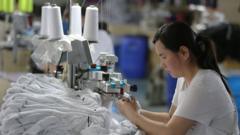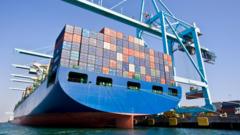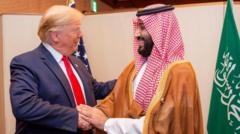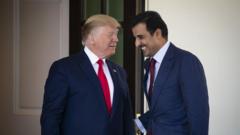In a recent social media update, President Trump declared a significant shift in trade relations between the US and China after their first day of discussions in Switzerland, describing the talks as friendly and constructive. As tariffs continue to impact both economies, the negotiations have raised hopes for potential concessions and de-escalation from both sides.
Trump Claims "Total Reset" in US-China Trade Relations After Talks in Switzerland

Trump Claims "Total Reset" in US-China Trade Relations After Talks in Switzerland
The US President expresses optimism following constructive discussions with Chinese officials amid escalating trade tensions.
Article text:
President Donald Trump has announced a "total reset" in trade relations between the United States and China following the inaugural day of negotiations in Switzerland. In a post on social media, Trump characterized the talks as "very good" and emphasized that discussions had progressed in a "friendly, but constructive, manner."
The backdrop to these talks is an escalating trade war that has seen the US impose tariffs as high as 145% on a range of Chinese imports, leading China to retaliate with levies of 125% on American goods. These critical negotiations are the first direct engagement between both nations since the onset of tariffs earlier this year.
In Geneve, US Treasury Secretary Scott Bessent and Chinese Vice-Premier He Lifeng are set to continue deliberations on Sunday, although specifics from the ongoing discussions remain scant apart from Trump's optimistic communications. "We want to see, for the good of both China and the U.S., an opening up of China to American business. GREAT PROGRESS MADE!!!" Trump noted in his statement.
While the White House Press Secretary Karoline Leavitt indicated that Washington would not reduce tariffs unilaterally, further suggesting that China would have to make concessions, there have been contradictory messages emerging. Reports from Beijing indicated an expectation that the US would need to ease its tariff stance, while Bessent reiterated that the current focus of negotiations was not about clinching a major trade deal but rather on "de-escalation."
As the two sides engage in talks, Chinese media suggested that the decision to negotiate with the United States came from a thorough evaluation of both global expectations and the interests of the nation. An earlier BBC investigation revealed the struggle faced by Chinese exporters, with one company, Sorbo Technology, reporting that a significant portion of their goods, originally meant for the US market, remained unsold in warehouses due to the tariffs.
The growing tension in this trade conflict saw President Trump introduce a universal baseline tariff on all imports last month, labeled "Liberation Day," which affected around 60 countries, classifying some as "worst offenders" including China and the EU. In addition, a 25% import tax on steel and aluminum was enacted alongside a further 25% tariff on vehicles and parts, although a trade agreement between the US and UK will lower the tariff on a set number of British cars.
As the world's two largest economies navigate through these turbulent waters, all eyes are on Geneva, hoping for signs of cooperation and economic relief that could benefit both nations.
President Donald Trump has announced a "total reset" in trade relations between the United States and China following the inaugural day of negotiations in Switzerland. In a post on social media, Trump characterized the talks as "very good" and emphasized that discussions had progressed in a "friendly, but constructive, manner."
The backdrop to these talks is an escalating trade war that has seen the US impose tariffs as high as 145% on a range of Chinese imports, leading China to retaliate with levies of 125% on American goods. These critical negotiations are the first direct engagement between both nations since the onset of tariffs earlier this year.
In Geneve, US Treasury Secretary Scott Bessent and Chinese Vice-Premier He Lifeng are set to continue deliberations on Sunday, although specifics from the ongoing discussions remain scant apart from Trump's optimistic communications. "We want to see, for the good of both China and the U.S., an opening up of China to American business. GREAT PROGRESS MADE!!!" Trump noted in his statement.
While the White House Press Secretary Karoline Leavitt indicated that Washington would not reduce tariffs unilaterally, further suggesting that China would have to make concessions, there have been contradictory messages emerging. Reports from Beijing indicated an expectation that the US would need to ease its tariff stance, while Bessent reiterated that the current focus of negotiations was not about clinching a major trade deal but rather on "de-escalation."
As the two sides engage in talks, Chinese media suggested that the decision to negotiate with the United States came from a thorough evaluation of both global expectations and the interests of the nation. An earlier BBC investigation revealed the struggle faced by Chinese exporters, with one company, Sorbo Technology, reporting that a significant portion of their goods, originally meant for the US market, remained unsold in warehouses due to the tariffs.
The growing tension in this trade conflict saw President Trump introduce a universal baseline tariff on all imports last month, labeled "Liberation Day," which affected around 60 countries, classifying some as "worst offenders" including China and the EU. In addition, a 25% import tax on steel and aluminum was enacted alongside a further 25% tariff on vehicles and parts, although a trade agreement between the US and UK will lower the tariff on a set number of British cars.
As the world's two largest economies navigate through these turbulent waters, all eyes are on Geneva, hoping for signs of cooperation and economic relief that could benefit both nations.























